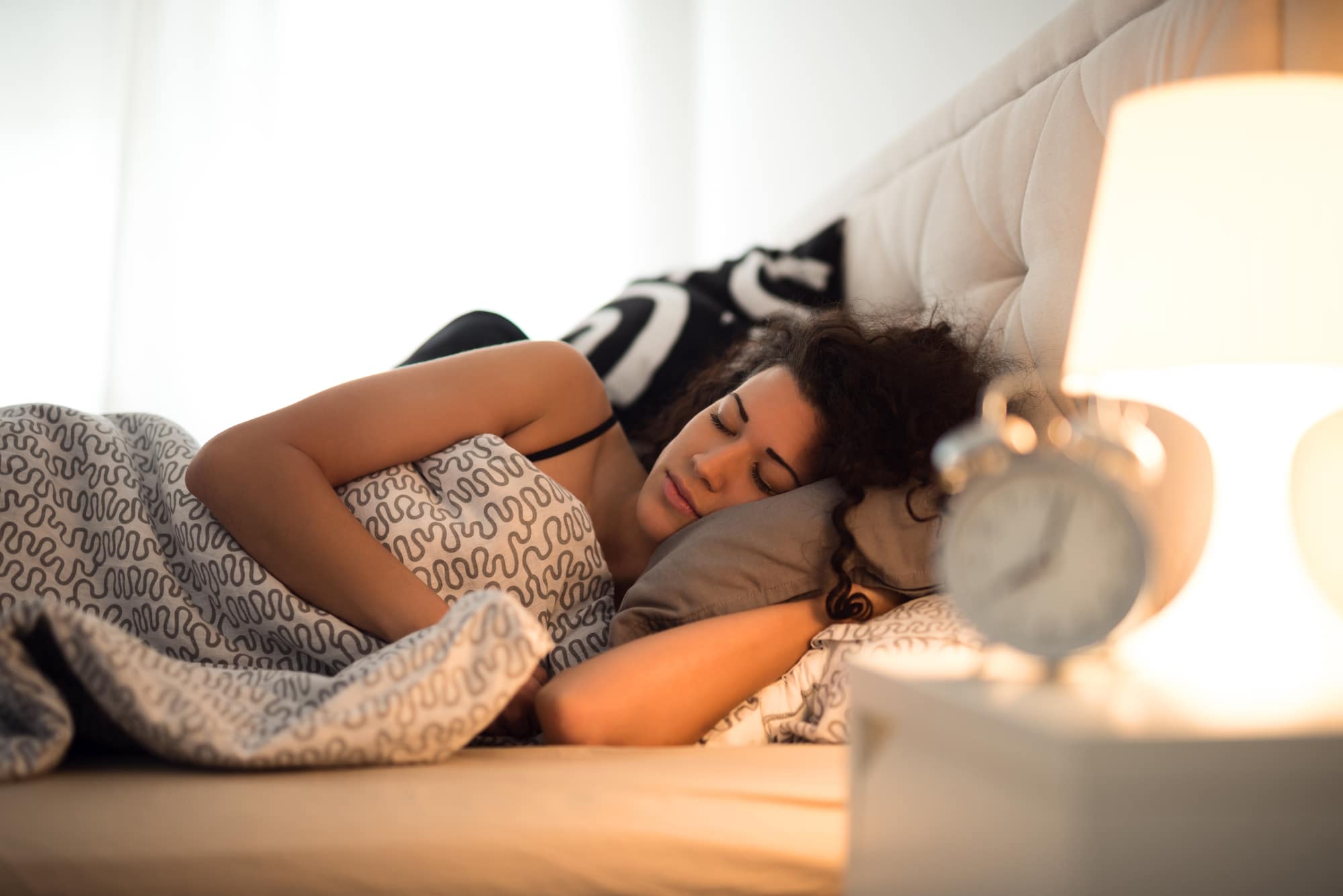Sleep is an essential aspect of our daily lives, playing a crucial role in maintaining our physical and mental well-being. However, many individuals struggle with achieving quality sleep on a regular basis. To address this issue, this article presents evidence-based tips for better sleep. These tips are grounded in scientific research and aim to provide readers with practical strategies to improve their sleep quality.
The first set of recommendations focuses on establishing a consistent sleep schedule and creating a relaxing bedtime routine. Research suggests that maintaining a regular sleep-wake pattern helps regulate the body’s internal clock, promoting better overall sleep. Additionally, engaging in relaxing activities before bed, such as reading or taking a warm bath, can signal the brain that it is time to wind down and prepare for restful sleep. The second set of tips emphasizes the importance of creating a comfortable and dark sleep environment while limiting exposure to electronic devices before bed. Dimming lights and reducing noise can enhance relaxation, while avoiding screens prior to bedtime helps mitigate the stimulating effects of blue light on melatonin production – a hormone vital for regulating sleep-wake cycles.
By following these evidence-based strategies for better sleep, individuals can significantly improve their chances of achieving restful and rejuvenating nights’ rest. Implementing these tips may require some adjustment initially but fostering healthy sleeping habits is worth the effort considering its long-term benefits on overall health and well-being.
Establish a Consistent Sleep Schedule
Maintaining a regular sleep schedule can significantly improve the quality and duration of your sleep. Establishing a sleep schedule involves going to bed and waking up at the same time every day, even on weekends. This consistency helps regulate your body’s internal clock, also known as the circadian rhythm, which plays a crucial role in determining when you feel awake or tired. By maintaining a consistent sleep routine, you train your body to recognize when it is time to sleep and when it is time to wake up. This can lead to more restful nights of sleep and increased alertness during the day.
In addition to establishing a regular sleep schedule, maintaining a consistent bedtime routine can also contribute to better sleep. Engaging in relaxing activities before bed signals to your brain that it is time to wind down and prepare for sleep. These activities could include reading a book, taking a warm bath, or practicing relaxation techniques like deep breathing or meditation. Avoiding stimulating activities such as using electronic devices or watching television before bed is important as these can interfere with your ability to fall asleep easily. By incorporating these practices into your nighttime routine consistently, you are more likely to experience improved sleep quality and overall well-being.
Create a Relaxing Bedtime Routine

Establishing a calming bedtime routine can significantly contribute to improving the quality of sleep. Engaging in wind down activities before bed can signal to the body that it is time to relax and prepare for sleep. These activities may include reading a book, taking a warm bath, or practicing relaxation techniques such as deep breathing or meditation. By participating in these calming activities, individuals are able to shift their focus away from the stresses of the day and promote relaxation.
In addition to engaging in wind down activities, creating a peaceful sleep environment is also essential for a better night’s rest. This includes ensuring that the bedroom is dark, quiet, and at a comfortable temperature. Light-blocking curtains or an eye mask can help eliminate any unwanted light sources that may disrupt sleep. Noise-cancelling devices or earplugs can be used to minimize any disruptive noises from outside sources. Maintaining a cool and comfortable temperature in the bedroom can also promote better sleep by preventing overheating or discomfort throughout the night. By establishing a relaxing bedtime routine and creating an optimal sleep environment, individuals can enhance their chances of achieving high-quality sleep on a regular basis.
Make Your Sleep Environment Comfortable and Dark
Creating a serene and dimly lit sleep space is crucial for promoting optimal rest and relaxation. By improving sleep hygiene and creating a comfortable environment, individuals can enhance their quality of sleep. One way to achieve this is by using blackout curtains in the bedroom. These curtains are designed to block out external light sources, such as streetlights or early morning sunlight, which can disrupt sleep patterns. By eliminating these distractions, individuals are able to create a darker sleeping environment that promotes deeper and more restful sleep.
In addition to using blackout curtains, there are other steps that can be taken to make the sleep environment more comfortable. It is important to choose a mattress and pillows that provide adequate support for the body, as well as bedding materials that are soft and breathable. The room temperature should also be kept cool, as cooler temperatures have been found to promote better sleep quality. Additionally, minimizing noise disturbances through the use of earplugs or white noise machines can further contribute to a peaceful sleeping environment. By paying attention to these details and making adjustments accordingly, individuals can create a comfortable and dark sleep space that enhances their overall sleep experience.
Limit Exposure to Electronic Devices Before Bed
Minimizing exposure to electronic devices before bedtime is recommended in order to optimize sleep quality. Engaging in a digital detox by limiting the use of electronic devices such as smartphones, tablets, and computers can have a positive impact on our sleep patterns. Electronic devices emit blue light, which has been found to suppress the production of melatonin, a hormone that regulates our sleep-wake cycle. By reducing exposure to this blue light before bed, we can enhance our body’s natural ability to fall asleep and stay asleep throughout the night.
Numerous studies have shown that exposure to electronic devices before bed can disrupt sleep patterns and lead to poor sleep quality. The blue light emitted by these devices interferes with the production of melatonin, making it more difficult for individuals to fall asleep. This disruption in the natural sleep-wake cycle can result in difficulties staying asleep throughout the night and feeling tired or groggy upon waking up. Therefore, it is crucial to limit exposure to electronic devices at least an hour before bedtime in order to promote better sleep hygiene and ensure restorative rest during the night.
Minimizing exposure to electronic devices before bedtime is essential for optimizing sleep quality. Implementing a digital detox by reducing screen time and avoiding blue light from electronic devices can positively impact our ability to fall asleep and maintain a healthy sleep pattern. By prioritizing good sleep hygiene practices and creating a comfortable environment free from digital distractions, individuals can improve their overall well-being through better quality rest at night.
Avoid Stimulants like Caffeine and Nicotine
To optimize sleep quality, it is advisable to refrain from consuming stimulants such as caffeine and nicotine. Caffeine, found in coffee, tea, energy drinks, and chocolate, is a central nervous system stimulant that can interfere with the body’s natural sleep-wake cycle. It has a half-life of about 5-6 hours, which means that even if consumed in the afternoon or evening, it can still have stimulating effects during bedtime. Therefore, it is recommended to limit or avoid caffeine intake at least six hours before going to bed. Instead of caffeinated beverages, one can opt for herbal teas or caffeine-free alternatives like decaf coffee or cocoa.
Nicotine is another stimulant that can disrupt sleep patterns. Found in cigarettes and other tobacco products, nicotine acts as both a stimulant and a sedative. While it may initially provide relaxation and stress relief due to its sedative properties, nicotine ultimately increases heart rate and blood pressure. These physiological effects make it difficult for individuals to fall asleep and achieve deep sleep stages throughout the night. If quitting smoking or using nicotine substitutes is challenging for someone trying to improve their sleep quality, seeking professional help from healthcare providers or support groups may be beneficial.
Avoiding stimulants such as caffeine and nicotine plays a crucial role in promoting better sleep quality. By limiting consumption of these substances before bedtime and considering alternatives like herbal teas or decaffeinated beverages instead of regular coffee or caffeinated drinks along with seeking support for quitting smoking when necessary; individuals can optimize their chances of achieving restful nights of sleep.
Exercise Regularly to Promote Better Sleep
Engaging in regular physical activity has been shown to enhance sleep quality and promote optimal rest. Numerous studies have demonstrated the benefits of exercise on improving sleep patterns. One study conducted by King et al. (1997) found that individuals who engaged in moderate-intensity aerobic exercise experienced better sleep quality compared to those who did not exercise regularly. The study also reported that participants who exercised for at least 150 minutes per week had fewer instances of insomnia symptoms.
Exercise benefits sleep quality through various mechanisms. Firstly, physical activity increases the release of endorphins, which are natural hormones that help regulate mood and reduce stress levels. By reducing anxiety and promoting relaxation, exercise can facilitate falling asleep faster and experiencing deeper sleep stages throughout the night. Secondly, regular exercise can help regulate circadian rhythms, the internal clock that controls our sleep-wake cycle. Consistent physical activity promotes a consistent schedule of sleeping and waking times, which can improve overall sleep quality.
Incorporating regular physical activity into one’s daily routine can significantly benefit sleep quality. Engaging in moderate-intensity aerobic exercises for at least 150 minutes per week has been shown to enhance restful sleep and reduce insomnia symptoms. By increasing endorphin release and regulating circadian rhythms, exercise acts as a natural remedy for promoting better sleep patterns.
Manage Stress and Anxiety
Transition: Moving on from the previous subtopic of exercising regularly to promote better sleep, it is essential to address another crucial aspect of achieving quality sleep – managing stress and anxiety. Stress and anxiety can have a significant impact on sleep patterns, often leading to difficulties in falling asleep or staying asleep throughout the night. Therefore, adopting effective stress management techniques and anxiety reduction strategies can greatly contribute to improving overall sleep quality.
Stress and anxiety are prevalent in today’s fast-paced society, affecting individuals’ mental health and well-being. These psychological states can lead to a range of physical and emotional symptoms that disrupt the natural sleep-wake cycle. During periods of heightened stress or anxiety, the body releases hormones such as cortisol, which stimulates alertness and increases arousal levels. This can make it challenging for individuals to relax their minds and bodies before bedtime, making it difficult to fall asleep or stay asleep during the night.
To manage stress effectively, individuals can incorporate various relaxation techniques into their daily routines. Deep breathing exercises, progressive muscle relaxation, mindfulness meditation, or engaging in calming activities like yoga or tai chi have been found beneficial in reducing stress levels before bedtime. These practices help activate the body’s relaxation response system by slowing down heart rate, lowering blood pressure, and promoting a sense of calmness.
In addition to relaxation techniques, addressing underlying causes of anxiety through therapy or counseling may be necessary for some individuals. Cognitive-behavioral therapy (CBT) has shown promising results in managing both stress and anxiety disorders by identifying negative thought patterns and implementing coping strategies. By working with a qualified therapist trained in CBT techniques, individuals can develop healthier responses to stressful situations while improving their ability to relax before bed.
By actively managing stress levels through various techniques like relaxation exercises or seeking professional help when needed for anxiety-related issues using therapeutic approaches like CBT individuals can create an environment conducive for better sleep quality. It is important to recognize that managing stress and anxiety is an ongoing process, and finding the right combination of strategies may require time and experimentation. Nonetheless, by dedicating efforts towards stress reduction and anxiety management, individuals can significantly improve their sleep patterns and overall well-being.
Avoid Heavy Meals and Alcohol Before Bed
One important factor to consider for improving sleep quality is the avoidance of heavy meals and alcohol consumption before bedtime. Consuming a heavy meal close to bedtime can lead to discomfort, indigestion, and increased acid reflux symptoms during sleep. This can disrupt the natural sleep cycle and prevent deep and restful sleep. It is recommended to have dinner at least two to three hours before going to bed in order to allow sufficient time for digestion.
In addition, alcohol should be avoided before bedtime as it can negatively impact sleep quality. While alcohol may initially make individuals feel drowsy and help them fall asleep faster, it actually disrupts the later stages of sleep, particularly Rapid Eye Movement (REM) sleep. REM sleep is crucial for memory consolidation and overall restoration of the body. Alcohol also acts as a diuretic, causing more frequent trips to the bathroom during the night which further disturbs an individual’s sleeping pattern.
For those who still desire a nighttime snack or beverage before bed, there are several meal alternatives and alcohol substitutes that promote better sleep. Opting for light snacks such as fruits or yogurt can provide nourishment without overloading the digestive system. Herbal teas like chamomile or lavender tea are known for their calming properties and can be enjoyed without interfering with a good night’s rest. Moreover, warm milk has long been associated with promoting relaxation due to its tryptophan content which aids in inducing drowsiness.
By avoiding heavy meals close to bedtime and refraining from consuming alcohol before bed, individuals can improve their chances of achieving high-quality uninterrupted sleep. Exploring alternative meal options such as light snacks or herbal teas can provide comfort without compromising on sound slumber. Making these adjustments in one’s routine promotes healthy sleeping habits that contribute positively towards overall well-being.
Limit Napping During the Day

Limiting daytime napping is recommended to optimize sleep quality and ensure a proper sleep-wake cycle. While napping can provide certain benefits such as enhanced alertness and improved mood, excessive or long naps during the day can disrupt nighttime sleep. The duration of a nap plays a crucial role in determining its effect on overall sleep patterns. Short power naps lasting around 10 to 20 minutes can offer quick bursts of energy and mental clarity without interfering with nighttime sleep. However, longer naps that extend beyond 30 minutes may lead to grogginess or sleep inertia upon awakening, making it harder to fall asleep at night.
By limiting daytime napping, individuals are more likely to experience consolidated and restful nighttime sleep. Napping for extended periods during the day can create an imbalance in the body’s natural circadian rhythm, which governs the sleep-wake cycle. This disruption can result in difficulties falling asleep or staying asleep at night, leading to decreased overall sleep quality. Additionally, excessive daytime sleeping may be indicative of underlying health issues such as insomnia or insufficient nocturnal rest.
While brief power naps can offer benefits like increased alertness and improved mood, it is important to limit their duration to avoid interfering with nighttime sleep. Prolonged daytime sleeping can disrupt the natural circadian rhythm and negatively impact overall sleep quality. Prioritizing consolidated nighttime rest over excessive daytime napping is essential for maintaining a healthy and balanced sleep-wake cycle.
Seek Professional Help If Sleep Problems Persist
If sleep problems persist, it is advisable to seek professional assistance in order to address potential underlying issues and improve overall sleep quality. While occasional difficulty falling asleep or staying asleep may be common and not cause for concern, chronic insomnia or other persistent sleep disturbances can have a significant impact on an individual’s physical and mental well-being. Seeking professional help can provide individuals with access to the expertise of healthcare professionals who specialize in sleep disorders and can offer evidence-based interventions tailored to their specific needs.
A healthcare provider trained in sleep medicine can conduct a thorough evaluation to determine the causes of ongoing sleep problems. They may use various tools such as questionnaires, interviews, and even overnight monitoring tests like polysomnography to assess factors that could be contributing to the difficulties. These factors may include medical conditions (such as sleep apnea or restless legs syndrome), mental health disorders (such as anxiety or depression), medication side effects, or lifestyle habits that negatively impact sleep hygiene. Once the underlying causes are identified, appropriate treatment options can be recommended, which may include cognitive-behavioral therapy for insomnia (CBT-I), medications if necessary, or other targeted interventions.
Seeking professional help is crucial when sleep problems persist beyond occasional disruptions. Professionals specializing in sleep medicine possess the knowledge and resources needed to identify potential underlying issues and develop personalized treatment plans aimed at improving overall sleep quality. By addressing these issues early on through professional assistance, individuals can enhance their well-being by obtaining adequate restorative rest each night.
Conclusion
In conclusion, implementing these 10 tips can greatly improve the quality of sleep. Establishing a consistent sleep schedule and creating a relaxing bedtime routine help regulate the body’s internal clock and signal it to prepare for rest. Creating a comfortable and dark sleep environment minimizes distractions and promotes deep sleep. Limiting exposure to electronic devices before bed reduces stimulation that can interfere with falling asleep. Avoiding stimulants like caffeine and nicotine prevents their disruptive effects on sleep patterns.
Managing stress and anxiety through relaxation techniques or seeking professional help is crucial for achieving better sleep. Additionally, avoiding heavy meals and alcohol before bed allows the body to focus on resting instead of digestion processes. Limiting daytime napping helps maintain a regular sleep-wake cycle, making it easier to fall asleep at night. Lastly, if sleep problems persist despite these efforts, seeking professional help is recommended to address any underlying issues that may be interfering with restful sleep.
By following these tips consistently, individuals can establish healthy sleeping habits that promote optimal physical and mental well-being. Prioritizing good-quality sleep contributes positively to overall health, productivity, and cognitive function throughout the day. It is essential to recognize the importance of adequate rest as an integral part of maintaining a balanced lifestyle.



I presently bought my second mattress to try. First was a Broyhill semi firm and pressure point woke me up. Second one I bought a Brooklyn mattress “soft” after research with a two inch each of 2 different layers of latex and a 6″ memory foam. At felt great, nice and cushioned to go to bed but then awoke tossing because pressure in my shoulder and hip. I turned and soon felt it on the other side. No matter what I did after a while the pressure woke me up.
I had an air mattress for 15 years and slept on it just fine until it started leaking. Now I am thinking of a coil mattress, seen on your reviews. I am 70 years old, Walk daily about 3-4 miles do some Pilates and 15 minutes yoga. Weigh 122 lbs. Any suggestions? I am becoming frustrated with this waking daily with shoulder and hip pains, I did not have before.
Hi Anna,
Hope you are well. Sorry to hear about your issues with recent mattresses. For ultimate pressure point relief, a medium density memory foam mattress is best. Latex can be rather firm, so a top layer of latex will perhaps not conform to your body shape as good as memory foam. Alternatively, as you’ve already had good experiences with air mattresses you could buy another, one with neverflat technology is ideal. The benefits of air mattresses with built in pumps are that you can customize the firmness levels according to your requirements.
Hope this helps.
Thanks for the tips. Having a good sleep is very important to have a healthy living. This will help people who are having sleep problems.